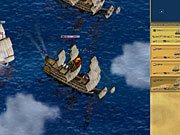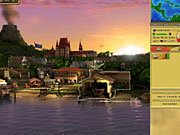Popular games commonly inspire similar efforts--sometimes even years later--and Port Royale, Ascaron's recent game of trading and buccaneering, paid homage to Sid Meier's classic Pirates! But the developer has taken the imitation a step further with Pirate Hunter by removing the complicated strategy elements. The new game reworks the satisfyingly open-ended Port Royale with a tighter focus on combat. Commanding a single ship, you'll encounter infamous pirates, persistent pirate hunters, and towns bristling with cannons. The direct single-ship controls feel much more like Pirates!, and the new mechanics create some engaging battles. However, the new linear goal structure limits and oversimplifies Pirate Hunter's gameplay in a way that removes the free-ranging charm.

Ascaron's games haven't received wide distribution in the US, so it's no surprise if you didn't hear of Port Royale's limited release earlier this year. Released by a new publisher, Pirate Hunter takes the earlier game and makes a handful of changes, mostly to eliminate the elaborate trading and building elements. Instead of having free reign over your choice of time period, difficulty level, and national allegiance, the new game locks the settings in to create a series of long chapters. The first scenario starts you off playing with Spain on the easiest setting and includes a series of tutorial elements that will walk you through navigation, sea battles, and docking at towns to get supplies and missions. The goals for the scenarios are clearly marked to one side of the screen. For example, you might see: Capture and annex a certain number of towns in a ten-year period. Pirate Hunter's world is plenty dynamic, and handing towns from one nation to another lets you make a major mark on the Caribbean.
As an aspiring buccaneer, closely aligned with one of four nations--England, France, Holland, or Spain--you seek fame and fortune by taking on missions, mostly with military objectives, from the governors located in major towns. The missions can start out as innocuous exploration or reconnaissance assignments, but, as you gain battle experience, aggressive convoy hunting, looting, and town assault goals start coming your way. While many missions have time limits, there's no penalty for failing or for not accepting an assignment, so you're free to wander the world.
Sailing around the Caribbean is simply a matter of right clicking in a direction, and your speed is determined by both the types of ships in your convoy and wind direction (indicated by fluffy clouds passing overhead). It's worth paying attention where you're going, since you can encounter hostile pirates or opposing buccaneers quite suddenly. Although you'll frequently speed things up to cross large distances, the standard game speed does give you time to identify a ship's flag and the biggest ship in a convoy. While making progress through a scenario is tied to one nation's missions, otherwise your path is open. So it's up to you to find your way by hunting pirates to earn bounties, finding larger ships you might capture to upgrade your convoy, or picking on another nation's trading ships.
As you'd expect from the title, Pirate Hunter is all about battles between wind-powered ships. You start off with a rather small but maneuverable ship and can prey on ships of similar size until you manage to capture the larger and much more powerful ship types, like frigates and galleons. Even if you have a few captured ships in your convoy, you can never control more than one in a sea battle. The positive consequence of the single-ship focus is that control of every shot and every turn is direct and simple. The action can require fast reflexes, and it is possible to defeat a more numerous and powerful enemy by making smart use of three different ammo types: one that strikes at a hull's hit points, one that damages the sails to slow a ship down, and one that wipes out crew in large numbers. The enemy AI often isn't very challenging at all--especially at the low difficulty setting the first scenario is locked at--but the enemy does make use of the three ammo types and its superior numbers to sink you from time to time. Although the combat has its challenges, there isn't enough variety to keep the constant succession of battles from becoming repetitive. Once you've earned plenty of money, experience, and ships, the temptation is to flee from the ordinary (nearly random) encounters with pirates to focus on national goals and hunting named, infamous pirates, which provides more challenge and reward.

As long as your reputation with a nation hasn't gotten to the point where its towns and ships shoot on sight, you're free to put in at any town. It's actually a good idea to do so between large battles, since it's the only place to save, repair your ships, and recruit crew to replace the frequent casualties. As in Ascaron's other naval games, towns are part of a dynamic economy, and prices for goods go up and down according to the laws of supply and demand. Here, though, there's little incentive to engage in trading other than to sell looted goods and buy up certain foodstuff to keep up crew morale and stave off a mutiny. The fact that--in contrast to Port Royale or the Patrician games--you're limited to just one convoy means that even if you tried, you could never earn as much money trading as you could earn hunting pirates. However, some missions cleverly turn the economic model on its head and have you try to ruin the fortunes of specific towns by sinking or capturing any ships that try to enter until the hapless locals end up in a recession.
As if to remind you of the lush Caribbean setting, sailing into port rewards you with a nice prerendered look at what a 17th century port town might look like. There are just a handful of things to do in town, which are highlighted as you move the mouse over buildings on the partially animated background. The prerendered style is new to Ascaron's games and is a welcome change from the game's otherwise locked top-down perspective. However, with only one town look per nation, there's little visual variety. The graphics for the navigation and combat views also have a nice look, with plenty of detail drawn into the 2D world map and some nice water effects for the 3D combat. In contrast to all this visual lushness, the audio can seem a bit sparse for the lack of any voice work at all. The sound effects are limited mostly to the thundering of cannons during combat, but elegant period music does help set the right tone overall.
Pirate Hunter comes close to being a faithful remake of Sid Meier's Pirates!, but the addition of linear scenarios, with locked game settings, doesn't add any depth or detail to make up for cutting out the open-ended style of Port Royale. What's more central to the mythos of pirates and buccaneers than being able to choose one's fate? The reward for jumping through a scenario's hoops is the chance to join a high score list, then start from scratch during a later, more challenging period of history. What Pirate Hunter does well is provide a healthy portion of ship combat that looks good, is easy to learn, and has enough intricacies to reward skillful play. There are bountiful fortunes sailing the high seas, and it's not hard to reach out and pluck them up.